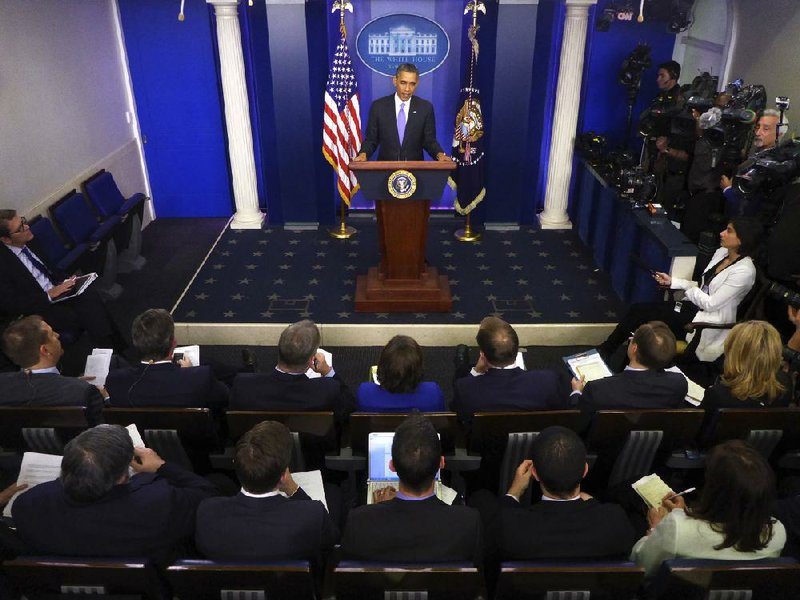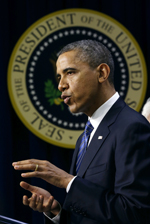WASHINGTON - Citing strong progress on the economy, President Barack Obama said at his annual year-end news conference Friday that 2014 “can be a breakthrough year for America” after a long season of recession and slow recovery.
When it came to the universally panned rollout of his health-care law, Obama conceded that “we screwed it up,” and said, “I’m going to be making appropriate adjustments once we get through this year.” It was unclear whether he meant to signal high-level personnel changes.
The president praised Congress for a recent, relatively modest budget compromise. “It’s probably too early to declare an outbreak of bipartisanship. But it’s also fair to say we’re not condemned to endless gridlock,” he said.
He also renewed his long-standing refusal to negotiate concessions with Republicans in exchange for legislation that will be needed in late winter or early spring to raise the nation’s debt limit. “It is not something that is a negotiating tool. It’s not leverage. It’s a responsibility of Congress,” he said, although he added that he was willing to discuss other issues separately.
Obama spoke from the White House briefing room podium as he concluded his fifth year as president, his hair far grayer than the day he was first sworn in. He and his family were departing later in the day for their holiday vacation in Hawaii.
The president opened his remarks with an upbeat assessment of the state of the economy and seemed determined not to stray from it.
Asked if this year had been the worst of his presidency so far, he laughed and said, “That’s not how I think about it.”
Obama’s polls are at or near the low point of his tenure in the White House. The rollout of his health-care website bombed, and high-visibility parts of his agenda have yet to make it through Congress, including a call for gun-restriction legislation in the wake of the shooting at a Newtown, Conn., elementary school a year ago and a sweeping overhaul of immigration laws.
“If you’re measuring this by polls, my polls have gone up and down a lot over the course of my career,” he said, and then repeated that the economy was finally showing significant progress.
In his review of the year, Obama also noted that U.S. combat troops will finally be withdrawn next year from Afghanistan.
On a key foreign-policy concern, Obama said it would be wrong to impose new sanctions on Iran at a time the United States and other nations are testing an interim accord designed to rein in Tehran’s nuclear program. If necessary, “we can pass new sanctions in a day,” he said, referring to lawmakers.
As for health care, Obama said that despite the problems, insurance sign-ups are surging now that the government’s website is working better for consumers.
“The health-care website problems were a source of great frustration,” the president said. “I now have a couple million people, maybe more, who are going to have health care on Jan. 1, and that is a big deal. That’s why I ranfor this office.”
“What that means is … the demand is there and the product is good,” he said.
Largely hidden from consumers, another set of technical problems is frustrating insurers, who say the government continues to send them inaccurate data on some enrolled individuals. Insurers call some of those jumbled enrollment files “orphans” and others “ghosts.”
They could turn into gremlins after Jan. 1 for some patients trying to use their new coverage. Consumers might show up at the pharmacy counter or doctor’s office only to be told they’re not in the system.
Obama turned aside a suggestion that the administration has made so many exemptions that it should have simply delayed the requirement for individuals to purchase coverage or face a penalty. Several lawmakers have called on him to do that, even some Democrats who voted for the legislation.
The pace of sign-ups still lags behind the projections made before the Oct. 1 start of the program and Thursday the administration said it will provide a “hardship exemption” to as many as 500,000 people who won’t have health plans on Jan. 1 because their policies are being canceled and they haven’t found new coverage that meets the standards of the new law.
The decision means those people can buy bare-bones catastrophic insurance and would be shielded from any fines if they go without medical insurance next year.
In recent weeks, insurers have told many people that their insurance policies were being canceled because they did not comply with the minimum coverage requirements of the law. Insurers usually offer to replace the coverage with new policies that do comply, providing more benefits at higher cost.
The Department of Health and Human Services issued a bulletin Thursday advising consumers, “If you have been notified that your individual market policy will not be renewed, you will be eligible for a hardship exemption and will be able to enroll in catastrophic coverage.”
The president minimized the significance of that accommodation Friday, calling it a net to catch a small number of people who may slip through the cracks.
The latest change in the health-care law comes just before the Monday deadline to purchase policies for coverage that starts Jan. 1. The exemption raised alarm bells with insurers, who said the exemptions may keep younger, healthier people from buying new coverage, leaving fewer premiums to help subsidize coverage for older Americans.
“This latest rule change could cause significant instability in the marketplace and lead to further confusion and disruption for consumers,” Karen Ignagni, the president of America’s Health Insurance Plans, the industry’s Washington-based lobbying group, said in an email through a spokesman.
Another insurance executive said that insurers had not expected a significant number of people over 30 to enroll in catastrophic plans, so their costs were not factored into the premiums.
Moreover, the executive said, the exemptions undermine the requirement for people to have coverage. That requirement, often called an individual mandate, is needed to guarantee that insurers attract young healthy people to help offset the costs of covering older Americans who require more medical care, insurers say.
Kathleen Sebelius, secretary of health and human services, said the premiums for catastrophic plans were, on average, about 20 percent lower than premiums for other plans available in the marketplace. Catastrophic policies cover three primary-care visits a year at no cost and provide free preventive health benefits, but typically require consumers to pay most other medical costs up to a certain amount, usually several thousand dollars a year.
Separately, officials said 3.9 million people have qualified for government health care through the law’s Medicaid expansion. Even so, things aren’t exactly humming along.
Healthcare.gov was down for part of the day Friday, as technicians attempted to fix an error that occurred Thursday night when the site was undergoing routine maintenance, officials explained.
The administration cannot afford for the balky website to crash this weekend. Because of Monday’s deadline to sign up, unusually heavy traffic is expected on the federal site and those run by states.
Information for this article was contributed by Julie Pace, Ricardo Alonso-Zaldivar and Kelli Kennedy of The Associated Press; by Roger Runningen and Alex Wayne of Bloomberg News; and by Robert Pear of The New York Times.
Front Section, Pages 1 on 12/21/2013


